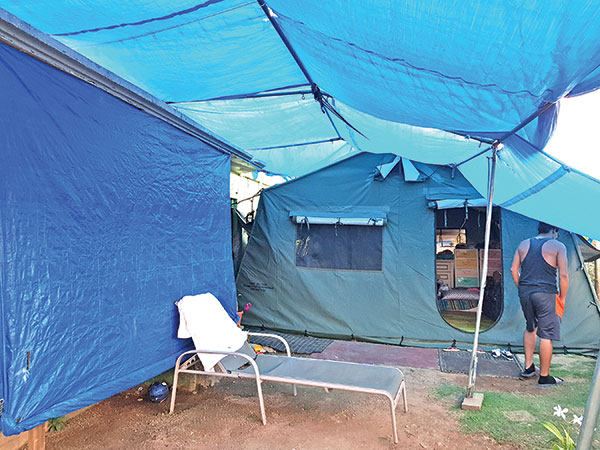‘When you lose everything, the little things mean a lot’
The current “house” of Enrico San Jose, six months after Super Typhoon Yutu. (REICA RAMIREZ)

(REICA RAMIREZ)
Enrico San Jose, who has lived in his house for more than 12 years, still considers himself lucky.
“Everything happened so fast. My three grandkids were with me and all I could think of was to keep them safe. Suddenly, the roof flew away, the ceiling came down, and all the windows were shattered,” he said.
With no roof over their heads since Super Typhoon Yutu leveled Saipan and Tinian in October 2018, he and his family were able to avail of government assistance through the TETRIS program, or Temporary Emergency Tent and Roofing Installation Support program
Six months later, they are still there.
It was, at first, difficult to adapt to the new environment. “It’s hard and unfamiliar, but you just have to live with what you have,” San Jose said.
That seems to be the prevailing outlook among those in temporary homes. Six months since Yutu devastated Saipan and Tinian, many people still live in broken homes and emergency tents. In San Jose’s case, due to the extensive damage to their home, which remains unfixed, San Jose’s family depend on tarps and one tent to survive.
When it gets too hot, his family stays in their damaged house. When it rains, they get many buckets for the leaks in the tarp.
“It really takes a lot of patience to get through the day, but I’m lucky that my family survived,” he added.
There were also many people who were alone when the typhoon destroyed the islands. A widowed mother, who lived in her house for more than 17 years, almost didn’t survive during the typhoon. She remembered her experience vividly. “The first thing I remember was my ceiling falling on top of me. Luckily, my door stopped it from collapsing, but I was stuck in a sitting position throughout the whole night. Everything around me started falling apart. I felt the roof being uprooted and the concrete walls moving. I thought it was the end for me. Because I was stuck, the next morning, no one knew I was inside all the debris. I had to climb my way through the debris until I reached my car.”
The first few months after the typhoon, she was living inside her car. Then someone gave her a tent. Now she considers herself lucky because she has a tent to sleep in. She may have lost everything but she continues to live as normally as possible.
“I’m very thankful that I had friends who still helped me through the challenges. After the typhoon, all I had were the clothes on my back, my phone, and a bottle of water.
“When you lose everything, the little things mean the most. You can’t take for granted what you have right now. It is a constant struggle, but at least I’m alive,” she added.
That speaks a lot of the miracle that, despite the ferocious winds, there were almost no fatalities from Yutu. One wall in an abandoned building did fall down and killed one person, while another presumably died from carbon monoxide poisoning from a generator’s exhaust, but many are citing the relative lack of fatalities from Yutu as reason enough to be grateful.




